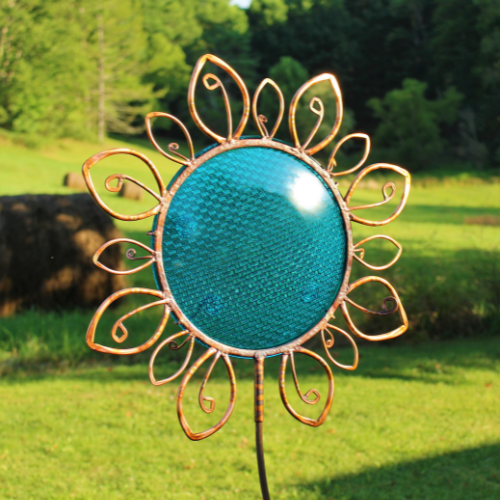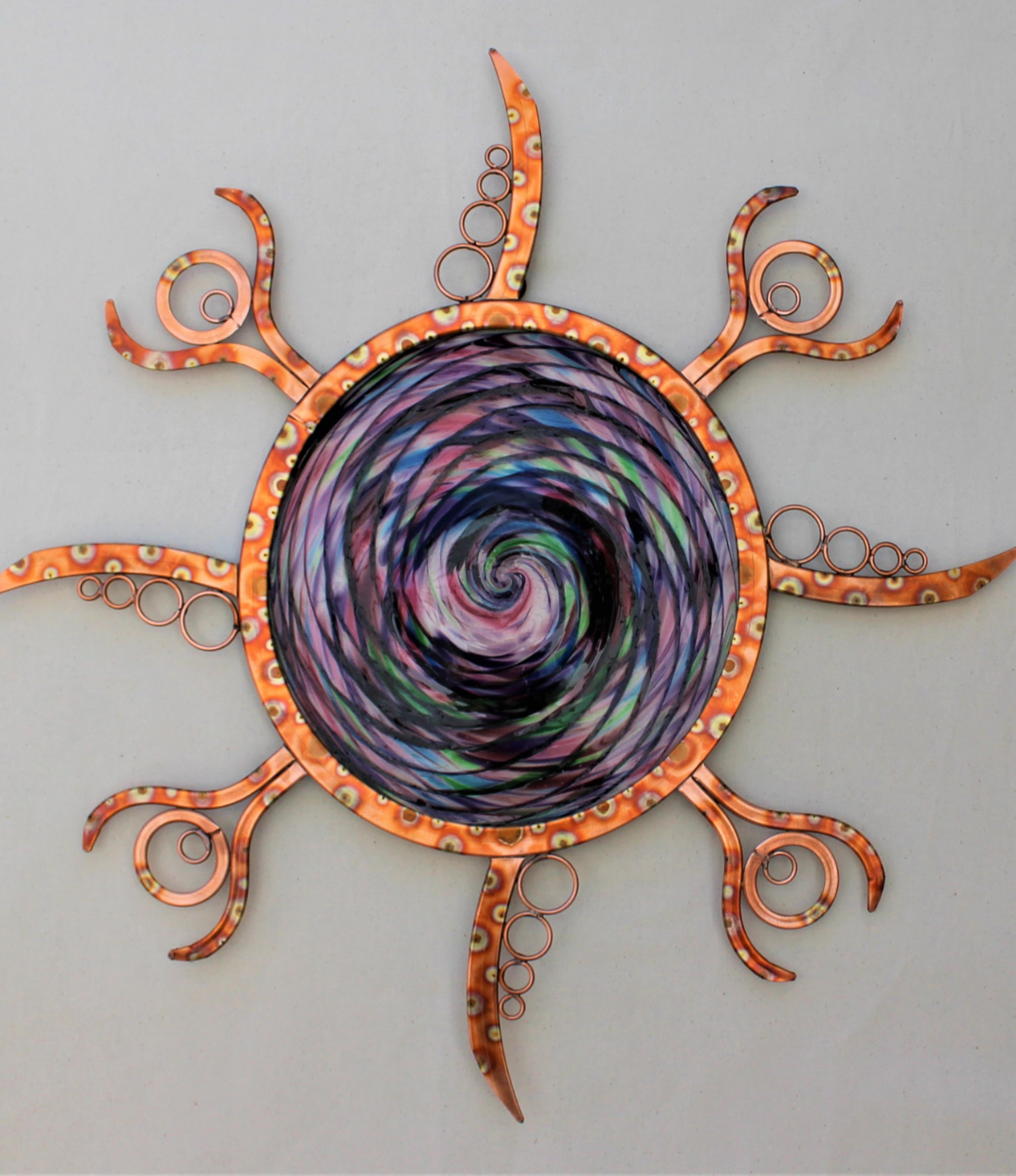Metal Art | How Does a Metal Sculpture Artist Craft Magnificent Works?
Selection of Raw Materials
A metal sculpture artist carefully selects the metal to breathe life into their vision. From iron's sturdy reliability to bronze's lustrous elegance, each metal brings its unique qualities and characteristics. Beyond aesthetics, the choice of metal hinges on the sculpture's intended location. Will it brave the elements outdoors or grace the refined ambiance of indoor space? This delicate balance between durability and aesthetics guides the artist's decision, ensuring the artwork can withstand the test of time while exuding sheer beauty.
Metal Preparation and Cleaning
A metal artist begins by purifying the raw material. Meticulously removing impurities and contaminants ensures a flawless foundation, setting the stage for the artist's creative prowess to shine through.
Like a painter preps their canvas, a metal sculptor readies the metal's surface. This preparation involves grinding, polishing, and refining the metal, creating a flawlessly smooth canvas upon which the artist's ideas will be etched.
Shaping and Forming
With the canvas primed, the sculptor dons their creative armor – wielding tools like a blacksmith at a forge. The dance of welding, the rhythmic hammering of forging, the graceful arcs of bending, and the precise artistry of cutting all come together in a symphony of technique.
The artist walks the tightrope between precision and creative liberty as the metal takes shape. Every cut, every weld, and every bend is a deliberate stroke, a choice that brings them closer to their envisioned masterpiece.
Incorporating Mixed Media
Sometimes, the story the artist wishes to tell requires more than metal alone. Wood adds warmth, glass reflects light, and stone anchors the piece. The harmonious fusion of different materials amplifies the sculpture's narrative, creating a multidimensional sensory experience. The interplay of textures and the marriage of contrasting materials elevate the sculpture into a realm of sensory delight. The rough embrace of metal against the smooth caress of wood or the cool touch of glass results in a tactile symphony that invites viewers to explore the artwork with their senses.

From Concept to Creation: The Artist's Creative Process
Inspiration and Ideation
Every masterpiece begins as a whisper of emotion, an echo of personal experiences that the artist channels into their work. Be it the joy of triumph, the weight of sorrow, or the dance of joy, these emotional hues are woven into the fabric of the sculpture, creating a connection that resonates with viewers.
Beyond personal narratives, the tapestry of inspiration is also spun from the threads of the world around us. The patterns of nature, the rich tapestry of cultures, and the intricate nuances of society all find their way into the artist's mind, lending depth and meaning to the creation.
Design and Planning
The spark of inspiration finds its first physical form in sketches and prototypes. Here, the artist's mind and hand collaborate to structure their vision. With each stroke of the pencil, the sculpture takes shape on paper, an embryonic design that promises what's to come.
Behind the scenes of artistic magic lies the meticulous calculation of proportions and dimensions. The artist's eye harmonizes aesthetics and engineering, ensuring that every angle, every curve, and every line aligns seamlessly to bring the envisioned creation to life.
The Role of Experimentation
Surprises often emerge in the crucible of creation – a flourish of metal that catches the light just so, an unforeseen texture that ignites the senses. Here, the artist's ability to adapt and evolve comes to the fore. They embrace these unforeseen twists, weaving them into the narrative of the sculpture with a masterful touch.
Experimentation isn't merely about adapting; it's about boldly pushing the boundaries of creativity. It's about asking "What if?" and daring to venture into uncharted territory. These brave explorations yield innovations that ripple through the artistic landscape, inspiring others and expanding the realm of possibility.
Challenges and Triumphs: Navigating the Artistic Journey
Technical Hurdles
Metal, unyielding and formidable, presents an artist with a worthy adversary. The sheer strength of this medium can pose challenges in shaping, bending, and coaxing it into the desired form. Yet, within these very limitations, the artist's ingenuity flourishes, devising techniques and methods to conquer the metal's obstinate nature.
Every stroke of the hammer, every weld, and every cut is an invitation for unforeseen challenges. Yet, in these moments of adversity, the artist's problem-solving prowess shines. They become alchemists of innovation, finding novel solutions that transcend the barriers imposed by the metal itself.
Emotional Investment
A unique bond forms between the artist and art as the sculpture takes shape. It's a tender connection – the artist's emotions etched into every curve and contour. Yet, the artist must also learn to step back, to detach, allowing the sculpture to breathe and evolve beyond its initial intentions.
In the labyrinth of creativity, frustration, and self-doubt can be constant companions. The artist's vision may seem out of reach, and the process can feel like an uphill battle. Yet, it's this very struggle that forges resilience. Through perseverance, the artist navigates these doubts, emerging stronger and renewed purpose on the other side.
Celebrating Successes
Amidst the challenges and doubts, there comes a pivotal moment – the realization that the sculpture embodies the envisioned masterpiece. It's a triumphant feeling, a testament to the artist's unwavering dedication. Once raw and unformed, the metal now stands as a tangible testament to their creative spirit.
The ultimate triumph lies in witnessing the metamorphosis of raw metal into a captivating work of art. The artist's hands, guided by passion and skill, have breathed life into the cold, unyielding material. The sculpture now resonates with stories untold, emotions unfurled, and dreams given shape.

The Artistry of Patina and Finis
Applying Patina for Color and Texture
A symphony of colors and textures, Patina results from an intricate dance between metal and chemical reactions. With the artist as conductor and composer, a palette of chemicals interacts with the metal's surface, producing a mesmerizing array of hues – from rustic earth tones to verdant blues and vibrant greens. Each patina is a fingerprint, a signature of the artist's touch and the metal's response. Beyond mere aesthetics, patina breathes life into a sculpture, infusing it with character and story. As wrinkles reveal, the stories etched on a person's face, and patina impart a history to the sculpture. It may evoke a sense of antiquity, mirror the passage of seasons, or resonate with the sculpture's narrative, drawing viewers into a deeper connection.
Protecting the Artwork
Beneath the surface allure of the patina lies a critical function: protection. Artists employ an arsenal of sealants, varnishes, and coatings to shield the sculpture from the ravages of time and the elements. Like a guardian of art, these substances create an impenetrable barrier against moisture, pollutants, and the wear and tear of existence.
The artist's work is not just about the present moment; it's a legacy destined for the future. By safeguarding the metal's integrity, these protective layers ensure the sculpture is a testament to the artist's skill and vision for future generations. It's a commitment to longevity, an investment in the enduring beauty of art.
Showcasing the Masterpiece: Display and Presentation
Selecting the Right Base or Pedestal
Just as a frame complements a painting, the base or pedestal enhances the sculpture's visual impact. The choice of material, texture, and color should harmonize with the sculpture's essence, allowing it to stand as a cohesive, captivating entity. While aesthetics are paramount, stability is equally crucial. A well-chosen base enhances the sculpture's beauty and ensures it stands securely, free from the threat of toppling over. The balance between visual allure and structural integrity is an art in itself, contributing to the overall harmony of the presentation.
Outdoor vs. Indoor Display Considerations
When a sculpture is destined for the great outdoors, it faces unique challenges. Unpredictable weather can pose a threat to the artwork's longevity. This is where the artist's technical acumen shines again, as they apply weather-resistant coatings that shield the metal from rust, corrosion, and the elements, ensuring its enduring beauty.
In the realm of indoor exhibitions, lighting and ambiance wield transformative power. The interplay of light and shadow accentuates the sculpture's contours, breathing life into its three-dimensional form. A carefully orchestrated interplay of illumination and environment crafts a sensory journey, guiding viewers' emotions and perceptions.
In the mesmerizing world of metal sculpture, raw metal transcends its elemental nature to become breathtaking art that speaks to the heart and soul. With skilled hands and unwavering vision, artists forge emotions, experiences, and ingenuity into every piece. From the selection of metals to the final presentation, each step is a symphony of creativity and craftsmanship.
Things To Do In Athens WV
Athens WV News
